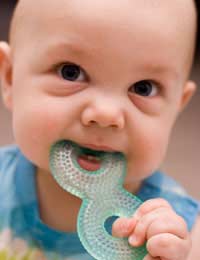Baby Hair Loss

Some babies are born with more hair than others, but in many cases their abundant locks can thin out during the first six months. If you’re worried that your baby is losing his hair, then don’t despair – read on to discover the facts about baby hair loss.
As worrying as baby hair loss is, and as sad as it can be to see your baby losing their locks so soon, it’s actually not unusual for babies to lose hair during the first six months of their life and generally it is not something to worry unduly about.
Why Do Young Babies Lose Hair?
Baby hair loss that occurs during the first six months of life is known as telogen effluvium. Newborn babies can be born with quite a head of hair, a fine dusting or be completely bald. In the case of those born with hair, some or all of it can be lost soon after due to changing hormones; specifically, hormone levels can drop after birth.It’s not dissimilar to what happens to women after giving birth – as their hormones change in the postnatal period, it’s common to experience some degree of hair loss.
Sometimes there are other factors involved which may be related to a baby’s hair loss, especially with slightly older babies. For example, if they always sleep in the same position, is prone to rubbing their head on their cot mattress or on the back of their baby seat, then the hair in these areas can become thinner or fall out.
What Can I Do To Prevent Hair Loss?
If your baby’s hair loss is due to their hormonal changes, then there isn’t anything you can do prevent it. If it could be due to habits, then are practical steps you can take to reduce more hair loss.If you think your baby’s hair loss could be due to their sleeping or sitting positions, then you could try making changes to the way in which your baby sleeps or sits. For example, if your baby likes turning and rubbing her head in a certain direction, rearrange the cot and place her down sleeping at the other end of her cot, so that she’ll hopefully be turning the other way.
In cases where the back of a baby seat could be linked to hair loss, you could try carefully fixing something to the back of the seat, perhaps that is more padded or feels different, to discourage your baby from rubbing her head in the spot she likes. It’s also good to remember that, as well as sitting in a baby seat, it’s important for your baby to have plenty of time lying on her tummy during the day. This helps their development, but will also help reduce the emphasis on the back of her head and could play a part in reducing habit-related hair loss.


Re: Ultrasounds - What is EFBW and GMS?
My wife is 32.6 weeks ...and the babys weight is 1971gms...is that normal or not...please reply me.....
Re: Ultrasounds - What is EFBW and GMS?
my 18th week and baby weight 252 it is gud or bad...please tell me....
Re: Ultrasounds - What is EFBW and GMS?
Hello!i have 21 weeks and 4 days pregnancy.. and my EFBW is 430gms.. is that normal?? Will my baby healthy or not??
Re: Abdominal and Pelvic Pain During Pregnancy
Left pelvic pain, backpain pregnency positive' is any problem, already ectopic happen
Re: Ultrasounds - What is EFBW and GMS?
My wife is 21 week 2 day . In scan report EFRW 415 GM is normal or not . Can you please help me to know current status of…
Re: Ultrasounds - What is EFBW and GMS?
I am 34.1wks pregnant my baby weight is 2215gm is my baby healthy
Re: Ultrasounds - What is EFBW and GMS?
My wife is 37weeks 5days pregnant E.F.B.W - 3010 grams how is she
Re: Ultrasounds - What is EFBW and GMS?
I am pregnant of 36 week 2 days and my EFBW is 1949 is it normal..?
Re: Ultrasounds - What is EFBW and GMS?
i had my ultrasound rhis sept 19 i wonder what is rhis number for efbw 2336 stands fir can you please give me an idea…
Re: Ultrasounds - What is EFBW and GMS?
my wife is 16.2 weeks and done early tiffa scan. E/O an elongated anechoic lesion with minimal internal echogencity…